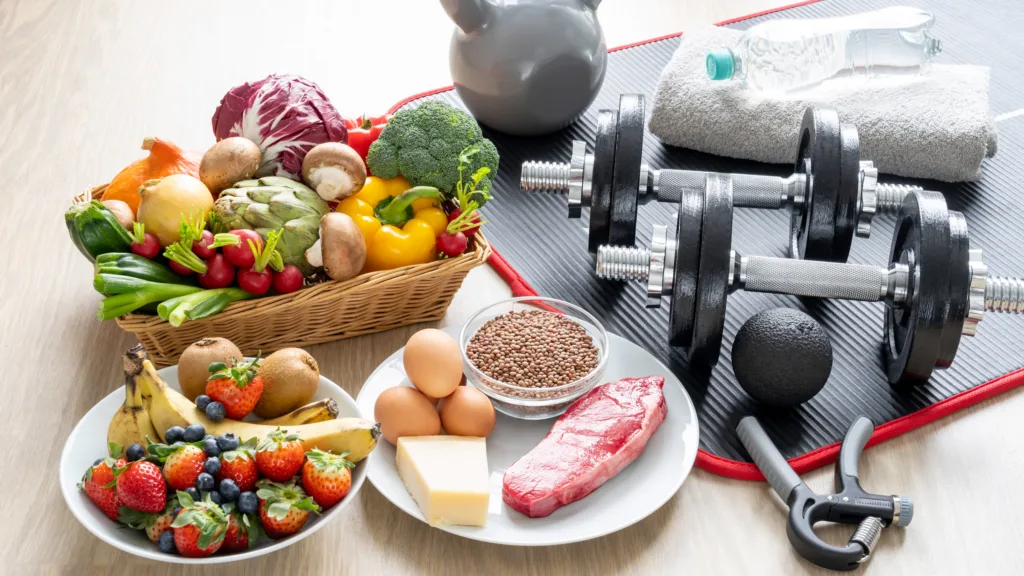Proper nutrition is absolutely essential for supporting an active, healthy lifestyle. Making sure you eat the right foods before and after workouts can help maximize your performance, speed up recovery, and assist you in meeting your fitness goals. However, the world of sports nutrition has propagated many myths and misconceptions over time that can truly derail your progress if you buy into them.

In this myth-busting blog post, we debunk some of the most common nutritional fallacies surrounding pre and post-workout foods. That way, you can fuel your body effectively for awesome workouts each and every time. Eating nutritious, balanced meals and snacks around your training sessions is crucial for boosting energy, strength, endurance and getting the absolute most out of all your hard work. Understanding the truth behind sports nutrition allows you to fully harness the power of proper fueling.
We’ll empower you to ignore myths, fad diets and confusion so you can make the most informed nutritional choices possible. That knowledge will allow your body to perform at maximum capacity whenever you hit the gym, lace up your sneakers for a run, or start a YouTube workout video. Let’s explore some common pre and post-workout nutritional myths now so you can optimize results!
Pre-Workout Nutrition Myths
Myth 1: “Carbs Are the Enemy of Weight Loss”
If you spend any time reading fitness or diet books, you’ve probably encountered advice warning you to severely limit or outright avoid all carbs. Many position carb-rich foods as the mortal enemy of weight loss success and the sole cause of unwanted fat gain. As a result, countless dieters wrongly vilify even healthy carbohydrates and ban them completely pre-workout (and otherwise) in hopes of losing weight.
But make no mistake – quality carbohydrates offer essential fuel to adequately power intense gym sessions as well as running, cycling and all types of sports. The sugars naturally present in fruits, vegetables, whole grains and starchy plant foods provide your muscles and brain with glycogen – their preferential source of energy during prolonged exercise. Working out without this vital fuel accelerates fatigue, hinders performance, slows recovery and may even cause losses in lean muscle mass over time.
Avoiding all dietary carbs can certainly promote rapid initial weight loss in the form of water weight and glycogen depletion. However, over the long run, low-carb and no-carb diets often backfire badly. They frequently cause rebound weight gain from bingeing on banned foods once willpower wears thin. Plus very low-carb diets force our bodies to derive energy from breaking down precious muscle tissue since glycogen gets slashed. This metabolic slowdown destroys lean tissue, wrecks your metabolic rate and makes it nearly impossible to achieve sustainable fat loss over time.
The smarter approach is to strategically time balanced, nutrient-dense carbohydrates instead of demonizing an entire macronutrient category. Whole grains like steel cut oats, farro, wild rice, buckwheat and whole-grain pasta or sprouted bread provide steady energy released slowly into your bloodstream. Fruits and starchy vegetables like potatoes, squash and plantains also contain healthy natural sugars to nourish muscles.
When timed properly before training, the right carbohydrates help you maximize each workout session instead of hitting fatigue quickly by running on empty. They assist enduring high-intensity sprints or long cardio sessions rather than bonking halfway through a spin class because your gas tank reads empty. Carbs give you the vital edge so don’t buy the hype labeling them “the enemy!”

Myth 2: “Protein Isn’t Necessary Before Exercise”
In resistance training and bodybuilding circles especially, a lot of attention gets placed on sufficient protein intake to spur gains in strength and muscle mass from lifting weights. Pre and post-workout protein shakes have virtually become standard practice. But less discussed is how beneficial getting adequate protein can be before ANY type of training – including cardiovascular exercise.
Many people focus almost exclusively on carbs when fueling pre-workout, failing to recognize the major performance, recovery and muscle benefits consuming protein-rich foods beforehand can also provide. Current research shows that taking in quality protein prior to both resistance and endurance training helps significantly decrease overall muscle damage during the session. It also better promotes increased strength and power adaptations from the workout compared to going protein-free pre-exercise.
Plus, one study found young women burned more total calories during a cardio workout after eating a protein-packed meal beforehand compared to when they ate lower protein pre-exercise meals. The amino acids abundant in protein provide the building blocks your muscles desperately need to fully repair from the demands of intense training. Consuming proteins before sweat sessions essentially helps prime the body for optimal recovery once the workout concludes.
Pre-exercise protein also triggers the release of key alertness hormones that keep you focused and energized even during longer metabolic resistance circuits or high-mileage runs. Basically protein offers an awesome pre-workout tool to support challenging gym sessions so you reap maximum results. Enjoy lean meats, poultry, fish, eggs, dairy and plant proteins like beans, nuts, seeds or tofu to take full advantage protein’s strengths when you need them most!
Myth 3: “Fasting for Better Fat Burn”
Intermittent fasting diets continue rising in popularity due to promised benefits like better blood sugar regulation, anti-aging effects, disease prevention and of course – enhanced fat burning. The concept involves restricting food intake to narrow 8-hour windows and fasting the remainder of the day. But some ardent advocates wrongly argue working out in a fasted state burns significantly more fat compared to exercising after a meal.
Despite the hype though, evidence doesn’t show fasting provides a real boost to fat loss from exercise compared to eating normally around workouts. In fact avoiding food entirely before training often works against your body rather than synergizing with it. Exercise physiologists note that working out unfueled forces your body to derive energy from breaking down its own precious lean tissues since glycogen gets nearly depleted after prolonged fasting. You also lack adequate amino acids from complete proteins to fully support the muscle-building and repair process.
Plus, fasting triggers hunger hormones that actually slow fat burning over the long run. When running on empty regularly before training, your body wants to cling to fat stores more stubbornly anticipating future starvation rather than letting go of excess fat easily. You’ll also struggle with completing high quality workouts lacking proper fuel and recovery elements crucial for optimizing body composition.
While managing hunger signals benefits some people psychologically on intermittent fasting plans, completely abstaining from ALL food and fluids prior to exercise usually proves counterproductive. The smarter strategy is sticking to lighter pre-workout mini-meals consisting of easy-to-digest carbs and lean proteins for hours of energy without an overly full feeling. You still need balanced nourishment before hitting the weights or lacing up sneakers to reach maximum fat burning potential and fulfill your fitness goals safely and responsibly.

Post-Workout Nutrition Myths
Myth 1: “You Don’t Need Food After Cardio”
Vigorous sweat sessions like running long miles outdoors, cycling up hills or sweating through metabolic circuit classes demand quick delivery of fuel both before AND after training. Unlike resistance exercise focused on muscle/strength building, most steady state cardio workouts primarily burn carbohydrates and some fat as their preferred fuels. So you need to swiftly replenish diminished energy stores post-exercise.
During intense cardio, stored carb fuels called glycogen get burned up at a rapid pace to keep pace with oxygen demands. Skimping on re-fueling after a tough workout slows the recovery process and hampers your ability to hit it just as hard next time. Consuming a strategic blend of both fast-acting carbs coupled with muscle-repairing protein within 30 to 60 minutes post-cardio instead assists proper recovery.
This timely combo also helps restore depleted glycogen lost in sweat while delivering amino acids to stressed muscles. Leading sports nutrition authorities advise ingesting 0.14-0.23 grams of quality protein per pound of body weight along with 0.5-0.7 grams of carbs per pound within an hour at most after high-intensity cardio finishes. Exercising enthusiastically while denying your body adequate nutrition won’t lead to positive results!
So be sure to take time post-cardio to correctly refuel with smart, high-performance food choices. Enjoy chocolate milk, Greek yogurt with berries and honey, eggs with avocado toast, nut butter banana sandwiches or homemade protein-packed smoothies instead of starving hardworking muscles. Proper post-sweat session nutrition provides the raw materials so you bounce back faster and stronger than ever!
Myth 2: “Only Protein Matters After Lifting”
In the quest to build maximum lean muscle mass from resistance training, many serious lifters overload on protein after workouts believing protein alone magically repairs exercise damage while adding slabs of muscle. Shoveling down supplements like whey protein shakes, egg whites and Greek yogurt certainly helps aid the muscle growth process after a tough training session. But while protein sits in the spotlight, the humble carbohydrate often gets overlooked as a crucial player for ideal recovery.
Hitting the gym challenges your muscles greatly from either handling very heavy loads or enduring high volumes of work. Both intensity and volume prompt varying degrees of small muscle tears at the microscopic level. Providing ample protein post-resistance exercise helps heal these damaged muscle fibers by supplying amino acid building blocks that stitch them back together. But carbs play an absolutely vital role as well by helping rapidly rebuild depleted energy reserves (glycogen) drained by challenging weight work.
Without restoring glycogen levels in muscle cells, the body can’t fully leverage protein for its muscle healing and growth functions. The scientific literature shows that ingesting both fast-acting carbohydrates coupled with protein (in a 3 or 4:1 carb to protein ratio) soon after training triggers superior improvements in glycogen recovery and muscle repair versus consuming either one alone. The simple carbs raise insulin levels which further assist pushing those muscle-building amino acids directly into needy cells.
Basically the evidence demonstrates that properly timing carbs and protein within the 60 to 90 minute post-workout “window of opportunity” highly enhances the body’s muscle recovery machinery for optimal results. By synergistically combining fast-digesting carbs along with protein when muscles are most primed, you set the stage for overcompensation and emerging even stronger on your next gym trip!

Myth 3: “Avoiding Fats After Training”
In the 1980s and even 1990s, prevailing fitness advice cautioned avoiding all dietary fats post-sweat session because fats reportedly slowed the digestion of crucial recovery nutrition. But emerging research demonstrates our bodies require moderate amounts of beneficial fats too as part of complete refueling efforts – even after intense training.
Certain anti-inflammatory fats participate in regulating recovery. Food sources like salmon, avocado, nuts/seeds, extra virgin olive oil and coconut contain healing omega-3s and other polyunsaturated and monounsaturated fats helping control damaging inflammation post-exercise. These heart-healthy fats even assistkey cellular functions tied to repairing exercise damage. Your body needs quality energy from mixed macronutrient sources, not just protein or carbs alone, to fully bounce back from vigorous workouts better than before.
So by combining lean proteins, fibrous complex carbs and inflammation-fighting smart fats in post-workout meals, you supply a full spectrum of required nutrients working synergistically to promote optimal recovery. Just be sure to stay adequately hydrated with plenty of water and mineral-rich beverages as well. Avoid unrealistic fat phobia and enjoy more nutritious mixed meals after pounding the iron or running laps to achieve awesome strength and endurance gains!
Wrap up
Harnessing the power of good nutrition before and after exercise provides a powerful platform for fitness success no matter your goals. Ignore those mythical nutritional villains and maximize your workouts by fueling wisely instead, based on sound science. Supply your body with a satisfying blend of lean proteins, fresh produce, whole grains and healing fats both prior to and immediately after intense training sessions.
Timed appropriately, awesome pre-workout nutrition choices give you an edge by helping you train with sustained power, intensity and dangerous motivation every single gym session. Refueling strategically post-exercise accelerates overall recovery so you continue making progress towards crushing those goals every week. Use quality foods to elevate performance, achieve body composition milestones faster, feel amazing and destroy personal records!
Empower yourself further by subscribing to our free email newsletter packed with truthful, evidence-backed fitness and nutrition wisdom straight to your inbox. Get awesome insights on exercise, weight loss, muscle building, nutrition therapy, longevity, meal planning and living your very best, healthiest lifestyle each day. Thanks for reading – now go demolish that next workout fueled for utter success!
Call to Action
Explore more science-backed fitness and nutrition articles on properly fueling workouts, accelerating fat loss, strategizing muscle gains and living a vibrant healthy lifestyle available anytime on our website. Get the real facts on sports nutrition so you can start maximizing gym efforts safely and experiencing the results you deserve.
And be sure to subscribe below to our free newsletter for awesome health and fitness updates delivered weekly straight into your email inbox. Every issue brings you insider tips to apply immediately so every trip to the gym propels your closer to your goals. Thanks for reading – now let’s crush those fitness goals together!
Thank you for reading this post, don't forget to subscribe to our free newsletter
!
